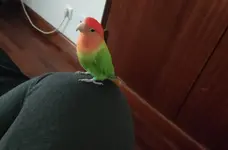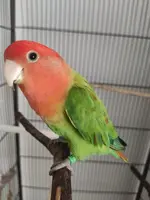Hello!
I need some help. I've had cockatiels since 2019 but in ~June 2022 a friend found a Lovebird on the street, lost, and with red suffusion. My friend doesn't want birds but I told him to bring him to me so I could take care of the bird at least until it was healthy, because I couldn't let it die. I have never owned Lovebirds before.
So, my friend brought him in. I took him to the vet, had him sexed (it's a male) and nursed him back to health. He's not 100% yet but he's much better from his red suffusion.
He must have been someone's pet because he was very sweet and not afraid of us at all. Me and my husband could pet him and he was a wonderful gentle soul. He has a leg band and according to it he is from 2020, so he's now 2 years old.
Fast forward to now, for a week or so he's been masturbating on a particular perch so I thought, okay he's hormonal. No problem. But now he's super SUPER aggressive towards me and me alone. My husband can stick his finger inside his cage and pet him, but if I so much as get close to the cage he'll puff up and get ready to shred my hands to bits out of nowhere. I also cannot pet him anymore outside of the cage either, since he'll either run away from me or bite me. Everything is normal with him and my husband though.
So my question is, are Lovebirds one person birds? Because I'm the one who takes care of all the birds, feed them and clean the cages, and having him aggressive towards me out of nowhere is a little discouraging. Or is it just a phase, maybe? Because he's hormonal?
Is it normal for a 2 year old male to show aggression like this?
I recorded a video of the behavior. Normally I'll ignore the behavior and just not bother him unless I need to, but today I just wanted to take a video of it.
Any help is appreciated!
I need some help. I've had cockatiels since 2019 but in ~June 2022 a friend found a Lovebird on the street, lost, and with red suffusion. My friend doesn't want birds but I told him to bring him to me so I could take care of the bird at least until it was healthy, because I couldn't let it die. I have never owned Lovebirds before.
So, my friend brought him in. I took him to the vet, had him sexed (it's a male) and nursed him back to health. He's not 100% yet but he's much better from his red suffusion.
He must have been someone's pet because he was very sweet and not afraid of us at all. Me and my husband could pet him and he was a wonderful gentle soul. He has a leg band and according to it he is from 2020, so he's now 2 years old.
Fast forward to now, for a week or so he's been masturbating on a particular perch so I thought, okay he's hormonal. No problem. But now he's super SUPER aggressive towards me and me alone. My husband can stick his finger inside his cage and pet him, but if I so much as get close to the cage he'll puff up and get ready to shred my hands to bits out of nowhere. I also cannot pet him anymore outside of the cage either, since he'll either run away from me or bite me. Everything is normal with him and my husband though.
So my question is, are Lovebirds one person birds? Because I'm the one who takes care of all the birds, feed them and clean the cages, and having him aggressive towards me out of nowhere is a little discouraging. Or is it just a phase, maybe? Because he's hormonal?
Is it normal for a 2 year old male to show aggression like this?
I recorded a video of the behavior. Normally I'll ignore the behavior and just not bother him unless I need to, but today I just wanted to take a video of it.
Any help is appreciated!


